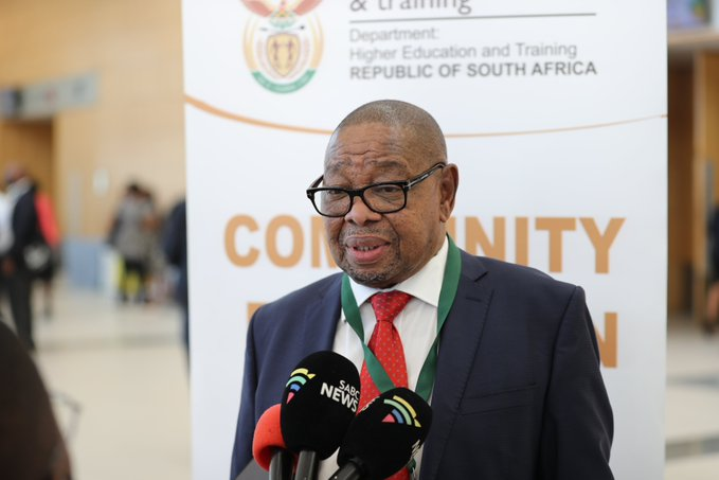Nzimande Urges Africa-Led Climate Research to Drive Global Knowledge
Nzimande emphasised that Africa’s historically Black universities must not remain peripheral in research.

- Country:
- South Africa
Minister of Science, Technology and Innovation Professor Blade Nzimande has called for a stronger African voice in global climate research, stressing the need for African-led science, innovation, and adaptation strategies to confront the continent’s growing vulnerability to climate change.
Speaking at the 3rd International Conference on Earth and Environmental Sciences (ICEES 2025), hosted by the University of Zululand in partnership with China’s Chang’an University, the Minister highlighted the central role of African institutions in advancing global knowledge production.
Strengthening Historically Disadvantaged Universities
Nzimande emphasised that Africa’s historically Black universities must not remain peripheral in research.
“I’m a very strong advocate for the deliberate development of the research capacity of our historically disadvantaged institutions, and for them to develop and be supported to be at the centre of knowledge production in our country and indeed globally.”
He warned against universities being “consumers of knowledge” produced elsewhere, instead urging the creation of a sovereign African Research and Development Agenda to assert continental leadership.
Africa’s Climate Crisis
The urgency of this agenda was underscored by findings from the 2023 World Meteorological Organisation (WMO) report:
-
African countries are losing 2–5% of their GDP annually to climate change.
-
Some nations allocate up to 9% of their budgets to climate response.
-
Up to 118 million extremely poor people (living on less than US$1.90 a day) face heightened risks from drought, floods, and extreme heat.
Nzimande said the continent is at the centre of the “triple planetary crisis” of climate change, pollution, and biodiversity loss, with escalating threats to water, ecosystems, and food systems.
“We are increasingly witnessing life-threatening heatwaves, floods, disappearing species and the severe pressures on water as well as ecosystems. Without coordinated action, the outcomes for future generations will indeed be devastating.”
In South Africa, he noted the toll of extreme weather events on rural communities and farmers, whose survival depends on biodiversity and climate stability.
South Africa’s Science Missions
The Minister outlined several initiatives under the Department of Science, Technology and Innovation (DSTI) to build research capacity and state readiness in climate and biodiversity science.
These include:
-
Science Missions on Global Change and Biodiversity, designed to strengthen research networks.
-
South African Environmental Observation Network (SAEON) – long-term ecological monitoring.
-
Alliance for Collaboration on Climate and Earth System Science (ACCESS) – a platform for climate and earth system science collaboration.
-
Centre for Global Change – research to support sustainable responses to environmental change.
South Africa is also advancing through its Research Infrastructure Roadmap, which includes:
-
National Equipment Programme,
-
South African Research Chair Initiative (SARChI), and
-
Centres of Excellence (CoEs) in priority fields.
The country continues to engage in global platforms such as the United Nations Framework Convention on Climate Change (UNFCCC) and the Convention on Biological Diversity (CBD).
Nzimande further announced the Global Change National Conference to be hosted later in 2025, aimed at deepening research collaboration and building climate adaptation strategies.
Investing in Young Scientists
The Minister strongly emphasised the importance of youth involvement in climate research, calling on students and early-career scientists to take advantage of emerging opportunities.
“Young researchers must grab this opportunity with both hands. Youth empowerment is not optional – it is an investment in Africa’s scientific future.”
Global Collaboration and Knowledge Sharing
The ICEES 2025 conference, attended by scientists and experts from over 70 countries across Africa, Asia, the Americas, Europe, and Australia, serves as a platform for academic exchange and industry collaboration.
It features keynote lectures by global experts and sessions designed to share research findings, challenges, and solutions in earth and environmental sciences.
The University of Zululand, hosting the conference, has positioned itself as a hub for climate research partnerships, symbolising the growing role of historically disadvantaged institutions in shaping Africa’s future scientific contributions.
Towards a Sovereign African Research Agenda
Nzimande concluded with a call for Africa to reclaim its agency in global knowledge production and build institutions capable of driving scientific innovation for climate resilience.
“Universities on the African continent must make their own distinct contribution to the global knowledge project. We must shape a sovereign African research agenda, rooted in our realities but connected to global solutions.”
Tags: Blade Nzimande, climate change Africa, ICEES 2025, University of Zululand, African research agenda, biodiversity loss, DSTI South Africa, climate science collaboration, youth in research, global climate policy
Would you like me to also prepare a fact-box explainer on the triple planetary crisis (climate change, pollution, biodiversity loss) to accompany this article?










